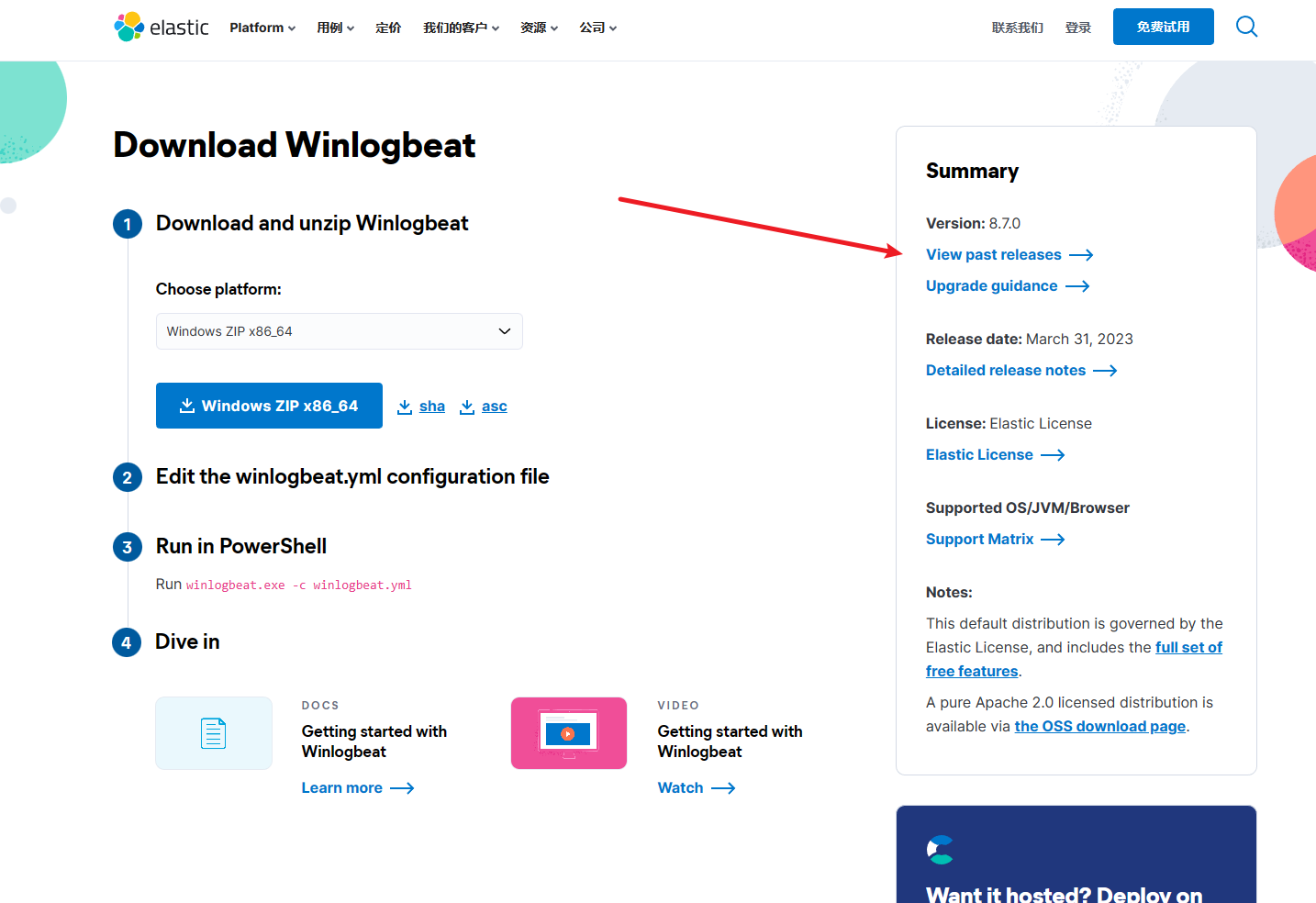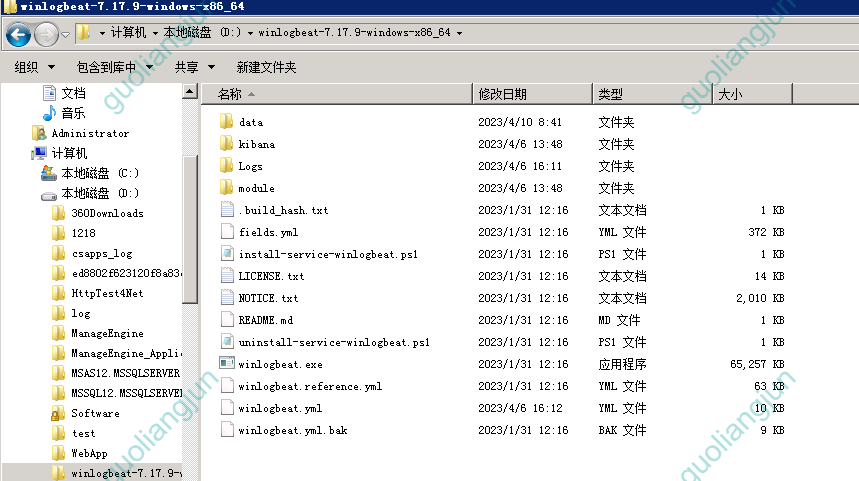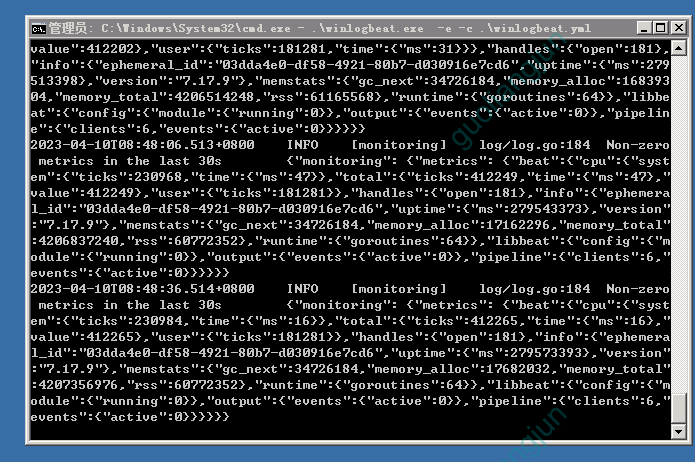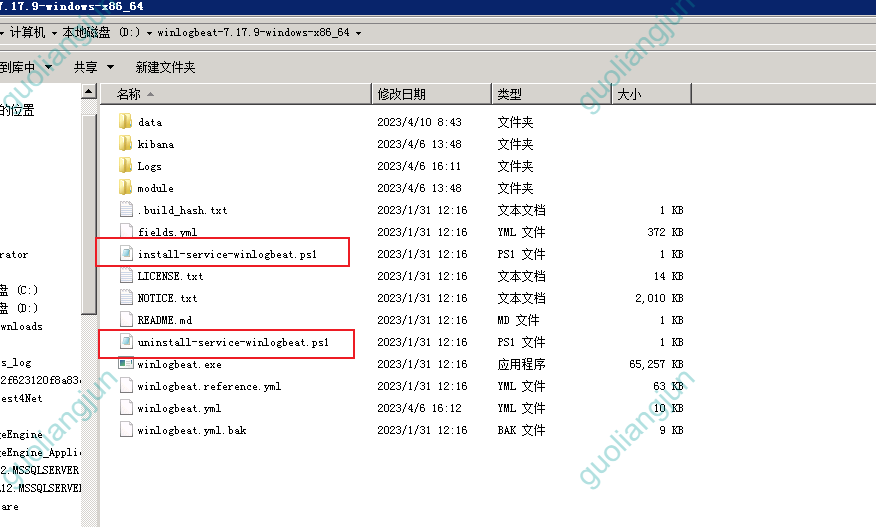Winlogbeat的安装与使用
前言
最新需求是需要收集windows一些安全日志和一些中间件的日志,但问了公司现有产品的公司是暂时不支持windows日志收集,于是乎安全日志打算使用Winlogbeat推送到kafka然后再进行入库消费记录。
介绍
Winlogbeat 是 Windows 事件日志的轻量级数据发送器。 虽然 Elastic 群集通常用于实时监视,但是可以对 Winlogbeat 进行调整,以手动将“冷日志”或旧的非活动 Windows 事件日志(EVTX)手动发送给 Elastic Stack。 该功能使分析人员可以从收集的系统图像中提取 EVTX文 件,并利用 Elastic 堆栈的功能进行调查。
安装
Download Link: https://www.elastic.co/downloads/beats/winlogbeat
我们可以根据自己的版本(和Elasticsearch一样的版本)来进行下载。(这里我的是7.17.9)


修改配置文件 winlogbeat.yml
###################### Winlogbeat Configuration Example ########################
# This file is an example configuration file highlighting only the most common
# options. The winlogbeat.reference.yml file from the same directory contains
# all the supported options with more comments. You can use it as a reference.
#
# You can find the full configuration reference here:
# https://www.elastic.co/guide/en/beats/winlogbeat/index.html
# ======================== Winlogbeat specific options =========================
# event_logs specifies a list of event logs to monitor as well as any
# accompanying options. The YAML data type of event_logs is a list of
# dictionaries.
#
# The supported keys are name, id, xml_query, tags, fields, fields_under_root,
# forwarded, ignore_older, level, event_id, provider, and include_xml.
# The xml_query key requires an id and must not be used with the name,
# ignore_older, level, event_id, or provider keys. Please visit the
# documentation for the complete details of each option.
# https://go.es.io/WinlogbeatConfig
winlogbeat.event_logs:
- name: Application
ignore_older: 72h
- name: System
ignore_older: 72h
- name: Security
ignore_older: 72h
event_id: 4624-4627, 4700-4800, -4735
- name: Microsoft-Windows-Sysmon/Operational
ignore_older: 168h
processors:
- script:
lang: javascript
id: sysmon
file: ${path.home}/module/sysmon/config/winlogbeat-sysmon.js
- name: Windows PowerShell
ignore_older: 168h
event_id: 400, 403, 600, 800
processors:
- script:
lang: javascript
id: powershell
file: ${path.home}/module/powershell/config/winlogbeat-powershell.js
- name: Microsoft-Windows-PowerShell/Operational
ignore_older: 168h
event_id: 4103, 4104, 4105, 4106
processors:
- script:
lang: javascript
id: powershell
file: ${path.home}/module/powershell/config/winlogbeat-powershell.js
- name: ForwardedEvents
ignore_older: 168h
tags: [forwarded]
processors:
- script:
when.equals.winlog.channel: Security
lang: javascript
id: security
file: ${path.home}/module/security/config/winlogbeat-security.js
- script:
when.equals.winlog.channel: Microsoft-Windows-Sysmon/Operational
lang: javascript
id: sysmon
file: ${path.home}/module/sysmon/config/winlogbeat-sysmon.js
- script:
when.equals.winlog.channel: Windows PowerShell
lang: javascript
id: powershell
file: ${path.home}/module/powershell/config/winlogbeat-powershell.js
- script:
when.equals.winlog.channel: Microsoft-Windows-PowerShell/Operational
lang: javascript
id: powershell
file: ${path.home}/module/powershell/config/winlogbeat-powershell.js
# ====================== Elasticsearch template settings =======================
setup.template.settings:
index.number_of_shards: 1
#index.codec: best_compression
#_source.enabled: false
# ================================== General ===================================
# The name of the shipper that publishes the network data. It can be used to group
# all the transactions sent by a single shipper in the web interface.
#name:
name: 'ip_addr'
# The tags of the shipper are included in their own field with each
# transaction published.
#tags: ["service-X", "web-tier"]
# Optional fields that you can specify to add additional information to the
# output.
#fields:
# env: staging
# ================================= Dashboards =================================
# These settings control loading the sample dashboards to the Kibana index. Loading
# the dashboards is disabled by default and can be enabled either by setting the
# options here or by using the `setup` command.
#setup.dashboards.enabled: false
# The URL from where to download the dashboards archive. By default this URL
# has a value which is computed based on the Beat name and version. For released
# versions, this URL points to the dashboard archive on the artifacts.elastic.co
# website.
#setup.dashboards.url:
# =================================== Kibana ===================================
# Starting with Beats version 6.0.0, the dashboards are loaded via the Kibana API.
# This requires a Kibana endpoint configuration.
setup.kibana:
# Kibana Host
# Scheme and port can be left out and will be set to the default (http and 5601)
# In case you specify and additional path, the scheme is required: http://localhost:5601/path
# IPv6 addresses should always be defined as: https://[2001:db8::1]:5601
#host: "localhost:5601"
# Kibana Space ID
# ID of the Kibana Space into which the dashboards should be loaded. By default,
# the Default Space will be used.
#space.id:
# =============================== Elastic Cloud ================================
# These settings simplify using Winlogbeat with the Elastic Cloud (https://cloud.elastic.co/).
# The cloud.id setting overwrites the `output.elasticsearch.hosts` and
# `setup.kibana.host` options.
# You can find the `cloud.id` in the Elastic Cloud web UI.
#cloud.id:
# The cloud.auth setting overwrites the `output.elasticsearch.username` and
# `output.elasticsearch.password` settings. The format is `<user>:<pass>`.
#cloud.auth:
# ================================== Outputs ===================================
# Configure what output to use when sending the data collected by the beat.
# ----------------------------kafka--------------------------------------
output.kafka:
hosts: ["10.196.69.25:9092","10.196.69.26:9092"]
topic: 'dola_windows_log'
required_acks: 1
compression: gzip
max_message_bytes: 1000000
# ---------------------------- Elasticsearch Output ----------------------------
# output.elasticsearch:
# Array of hosts to connect to.
# hosts: ["localhost:9200"]
# Protocol - either `http` (default) or `https`.
#protocol: "https"
# Authentication credentials - either API key or username/password.
#api_key: "id:api_key"
#username: "elastic"
#password: "changeme"
# ------------------------------ Logstash Output -------------------------------
#output.logstash:
# The Logstash hosts
#hosts: ["localhost:5044"]
# Optional SSL. By default is off.
# List of root certificates for HTTPS server verifications
#ssl.certificate_authorities: ["/etc/pki/root/ca.pem"]
# Certificate for SSL client authentication
#ssl.certificate: "/etc/pki/client/cert.pem"
# Client Certificate Key
#ssl.key: "/etc/pki/client/cert.key"
# ================================= Processors =================================
processors:
- add_host_metadata:
when.not.contains.tags: forwarded
- add_cloud_metadata: ~
# ================================== Logging ===================================
logging.to_files: true
logging.files:
path: D:\winlogbeat-7.17.9-windows-x86_64\Logs
logging.level: info
# Sets log level. The default log level is info.
# Available log levels are: error, warning, info, debug
#logging.level: debug
# At debug level, you can selectively enable logging only for some components.
# To enable all selectors use ["*"]. Examples of other selectors are "beat",
# "publisher", "service".
#logging.selectors: ["*"]
# ============================= X-Pack Monitoring ==============================
# Winlogbeat can export internal metrics to a central Elasticsearch monitoring
# cluster. This requires xpack monitoring to be enabled in Elasticsearch. The
# reporting is disabled by default.
# Set to true to enable the monitoring reporter.
#monitoring.enabled: false
# Sets the UUID of the Elasticsearch cluster under which monitoring data for this
# Winlogbeat instance will appear in the Stack Monitoring UI. If output.elasticsearch
# is enabled, the UUID is derived from the Elasticsearch cluster referenced by output.elasticsearch.
#monitoring.cluster_uuid:
# Uncomment to send the metrics to Elasticsearch. Most settings from the
# Elasticsearch output are accepted here as well.
# Note that the settings should point to your Elasticsearch *monitoring* cluster.
# Any setting that is not set is automatically inherited from the Elasticsearch
# output configuration, so if you have the Elasticsearch output configured such
# that it is pointing to your Elasticsearch monitoring cluster, you can simply
# uncomment the following line.
#monitoring.elasticsearch:
# ============================== Instrumentation ===============================
# Instrumentation support for the winlogbeat.
#instrumentation:
# Set to true to enable instrumentation of winlogbeat.
#enabled: false
# Environment in which winlogbeat is running on (eg: staging, production, etc.)
#environment: ""
# APM Server hosts to report instrumentation results to.
#hosts:
# - http://localhost:8200
# API Key for the APM Server(s).
# If api_key is set then secret_token will be ignored.
#api_key:
# Secret token for the APM Server(s).
#secret_token:
# ================================= Migration ==================================
# This allows to enable 6.7 migration aliases
#migration.6_to_7.enabled: true
启动
测试命令
.\winlogbeat.exe test config -c .\winlogbeat.yml -e
正式启动
.\winlogbeat.exe -e -c winlogbeat.yml

会弹出很多信息,毕竟我们 -e 参数就是把信息打印到屏幕上;
初次使用调试的时候很实用
把 winlogbeat 封装成服务启动(看需求安全是否需要)
如下图,我们可以看到文件夹里有封装成服务器的PS脚本

直接执行就安装
安装
.\install-service-winlogbeat.ps1
卸载
.\uninstall-service-winlogbeat.ps1
可能会提示没有权限,需要执行如下操作
Set-ExecutionPolicy -ExecutionPolicy RemoteSigned
这是powershell执行策略的问题,详情:https://learn.microsoft.com/zh-cn/previous-versions/windows/powershell-scripting/hh847748(v=wps.640)
启动服务
Start-Service winlogbeat
停止服务
Stop-Service winlogbeat
参考
- https://blog.csdn.net/UbuntuTouch/article/details/103170326
- https://www.elastic.co/guide/en/beats/winlogbeat/7.5/winlogbeat-installation.html
- https://cloud.tencent.com/document/product/614/80150
高端
公司还找人么
你要跳槽哇?